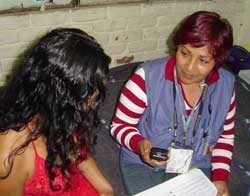Sex workers, a stigmatized population, are also at risk for a host of sexually transmitted infections. As the marginalized women are typically reluctant to visit health clinics, mobile data collection devices are particularly useful to researchers and health workers dealing with this population.In Peru, outreach teams preventively treat the sex workers for infections with the medication metronidazole, in addition to screening them for chlamydia and other conditions. Metronidazole, however, causes headaches, nausea and abdominal pain in some patients.
Since these side effects needed to be carefully monitored, the outreach teams had to track down sex workers in streets, bars, discotheques and even brothels to interview them. Initially, the data-gathering process relied on a paper-based system that proved to be inefficient and prone to privacy issues. Laptops were also tried, but because of their value and the personal information they carried, they put workers at risk for theft and assault.

Photo by Dr. Walter Curioso
Mobile devices can make it easier for researchers to study populations, such as sex workers, that
value privacy. Peru’s mobile phone infrastructure is substantial, and it soon became obvious that cell phones would be the best means of gathering real-time medical data from the women.
“We have close to an 80 percent cell phone penetration rate,” said Dr. Walter Curioso, a Fogarty grantee and physician-scientist at Cayetano Heredia University. “The market has been increasing since 1993 from almost 200,000 up to 23 million now.”
By implementing the cellphone data collection system at his research sites in both urban and rural areas of Peru, Curioso and his team were able to collect about 800 reports in three cities. They worked closely with the mobile technology company Voxiva, which provided the platform for the database server.
Using cell phones, the health workers collected information on side effects and sent the data to the server. If the database detected a severe adverse event, a text message and e-mail were generated and sent to a team leader, who contacted the community health worker in the field handling that patient. The health worker could access all of the data on the patient, including voice messages. Confidentiality and privacy were key concerns, so no names were collected on the database, only code numbers. The system greatly increased the ability of the public health workers at Cayetano to manage clinical STD programs, and gave them a means of real-time surveillance, according to Curioso.
Health worker surveys following the study showed support for the mobile technology and its user-friendly interface. Respondents identified the ease of reporting information as critical, since they often had only minutes to interact with the subjects to gather data. The sex workers also favored the cell phones, citing the confidentiality of the process and sensitive treatment of their personal information.
Editors note – wouldn’t it be easier to provide proper clinics and medications with fewer side effects ?
Theme:
Author:
Fogarty International Center

